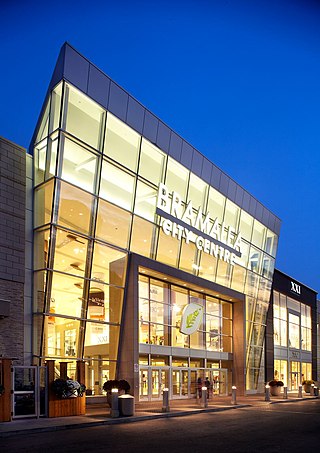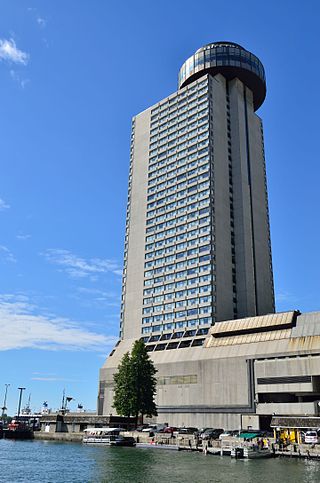
Macy's, Inc. is an American conglomerate holding company. Upon its establishment, Federated held ownership of the regional department store chains Abraham & Straus, Lazarus, Filene's, and Shillito's. Bloomingdale's joined Federated Department Stores the following year. Throughout its early history, frequent acquisitions and divestitures saw the company operate a number of nameplates. In 1994, Federated took over the department store chain Macy's. With the acquisition of The May Department Stores Company in 2005, the regional nameplates were retired and replaced by the Macy's and Bloomingdale's brands nationwide by 2006. Ultimately, Federated itself was renamed Macy's, Inc. in 2007.

Sears, Roebuck and Co., commonly known as Sears, is an American chain of department stores founded in 1892 by Richard Warren Sears and Alvah Curtis Roebuck and reincorporated in 1906 by Richard Sears and Julius Rosenwald, with what began as a mail ordering catalog company migrating to opening retail locations in 1925, the first in Chicago. In 2005, the company was bought by the management of the American big box discount chain Kmart, which upon completion of the merger, formed Sears Holdings. Through the 1980s, Sears was the largest retailer in the United States. In 2018, it was the 31st-largest. After several years of declining sales, Sears's parent company filed for Chapter 11 bankruptcy on October 15, 2018. It announced on January 16, 2019, that it had won its bankruptcy auction, and that a reduced number of 425 stores would remain open, including 223 Sears stores.

The Bramalea City Centre is a large shopping mall located in the city of Brampton, Ontario, Canada. With over a 1.5 million square feet of retail space and more than 300 outlets, it is one of Canada's largest shopping malls. Regarded as a super regional mall, the Bramalea City Centre has a market of more than 500,000 residents and attracts 16 million visitors annually. The Bramalea City Centre is located near the intersection of Queen Street and Dixie Road, just east of Highway 410.

Broadway Stores, Inc., was an American retailer based in Southern California. Known through its history as Carter Hawley Hale Stores and Broadway Hale Stores over time, it acquired other retail store chains in regions outside its California home base and became in certain retail sectors a regional and national retailer in the 1970s and 1980s. The company was able to survive takeover attempts in 1984 and 1986, and also a Chapter 11 bankruptcy filing in 1991 by selling off most of its assets until August 1995 when its banks refused to advance enough additional credit in order for the company to be able to pay off suppliers. At that point, the company sold itself to Federated Department Stores for $1.6 billion with the acquisition being completed on October 12, 1995.
Robert Joseph Antoine Campeau was a Canadian financier and real estate developer. Starting from a single house constructed in 1940 in the Alta Vista neighbourhood of Ottawa, Ontario, Campeau built a large land development corporation around the development of the suburb of Kanata. Expansion in the U.S. led Campeau to diversify into the ownership of retail department stores to anchor commercial development projects. The Campeau Corporation used leveraged buyouts to buy the department stores and went bankrupt when it could not maintain the debt payments, in the largest retailing bankruptcy at the time in U.S. history.
Jordan Marsh was an American department store chain that was headquartered in Boston, Massachusetts, and operated throughout New England. It was founded by Eben Dyer Jordan and Benjamin L. Marsh in 1841. The ownership of Jordan Marsh was transferred between several holding companies during its operation, including Hahn Department Stores in 1928, Allied Stores in 1935, and Federated Department Stores in 1988. The brand was retired and most stores were converted into the New York City-based Macy's in 1996.
Foley's was a regional chain of department stores owned by Federated Department Stores, later owned by May Department Stores (1988-2005) and headquartered in Downtown Houston, Texas. On August 30, 2005, the division was dissolved and operation of the stores was assumed by Federated's Macy's West and Macy's South divisions. Foley's operated stores in Texas, Colorado, Louisiana, Arizona, Oklahoma and New Mexico. On September 9, 2006 Foley's and all the regional May Co. stores names were phased out and rebranded as Macy's.
Strawbridge's, formerly Strawbridge & Clothier, was a department store in the northeastern United States, with stores in Pennsylvania, New Jersey, and Delaware. The Center City Philadelphia flagship store was, in its day, a gracious urban emporium. The retailer started adding branch stores starting in the 1930s and, by their zenith in the 1980s, enjoyed annual sales of over a billion dollars By the 1990s, Strawbridge's became part of the May Department Stores conglomerate until May's acquisition by Federated Department Stores on August 30, 2005.
Joseph Jean Pierre Benoit was mayor of Ottawa from 1972 to 1974. He was a lawyer by career but subsequently pursued a variety of interests.
Maas Brothers was a leading Tampa, Florida department store founded by Abe and Isaac Maas in 1886 that grew from a small 23-by-90-foot store to a chain of 39 stores throughout the Gulf Coast of Florida. The Maas Brothers brand went defunct in 1991 when it was consolidated into the Burdines department store chain, which in turn merged with Macy's in 2005.

The Westin Harbour Castle Toronto is a large hotel opened in 1975 on the waterfront of Toronto, Ontario, Canada. It is part of the Westin Hotels chain within Marriott International.

Vornado Realty Trust is a real estate investment trust formed in Maryland in 1982, with its primary office in New York City. The company invests in office buildings and street retail in Manhattan.

Associated Dry Goods Corporation (ADG) was a chain of department stores that merged with May Department Stores in 1986. It was founded in 1916 as an association of independent stores called American Dry Goods, based in New York City.
Allied Stores was a department store chain in the United States. It was founded in the 1930s as part of a general consolidation in the retail sector by B. E. Puckett. See also Associated Dry Goods. It was the successor to Hahn's Department Stores, a holding company founded in 1928. In 1935 Hahn's was reorganized into Allied Stores.
I. Magnin & Company was a San Francisco, California-based high fashion and specialty goods luxury department store. Over the course of its existence, it expanded across the West into Southern California and the adjoining states of Arizona, Oregon, and Washington. In the 1970s, under Federated Department Stores ownership, the chain entered the Chicago, Illinois, and Washington, DC, metropolitan areas. Mary Ann Magnin founded the company in 1876 and named the chain after her husband Isaac.
Filene's Basement, also called The Basement, was a Massachusetts-based chain of department stores which was owned by Retail Ventures, Inc. until April 2009 when it was sold to Syms.
Edward John DeBartolo Sr. was an American businessman. In 1971, his Ohio-based corporation was ranked as 47th among the nation's top 400 construction contractors. In 1983, DeBartolo was included on Forbes magazine's first Forbes 400 list of richest Americans.
Donaldson's, previously known as the L. S. Donaldson Company, Minneapolis, Minnesota is a defunct department store company.

The Children's Place Inc. is a specialty retailer of children's apparel and accessories headquartered in Secaucus, New Jersey. It also markets apparel under the Children's Place, Place, Baby Place, and Gymboree brand names.
JMB Realty was a real estate investment company based in Chicago. In 1993, after suffering during the early 1990s recession, the company spun off its retail properties as Urban Shopping Centers, Inc., which was acquired by Rodamco in 2000 and broken up. After selling off its remaining assets in the late 2000s, JMB Realty was defunct; although its debt finance group was spun-out as JMB Financial Advisors and still exists as a going concern based in Chicago.









